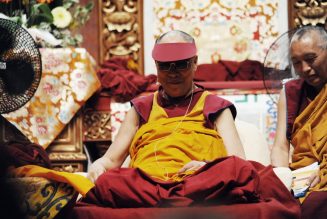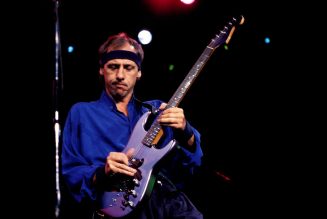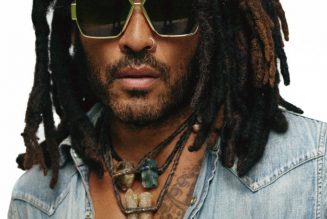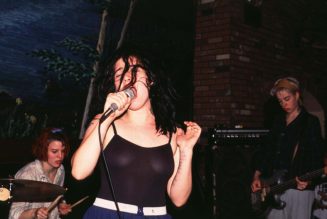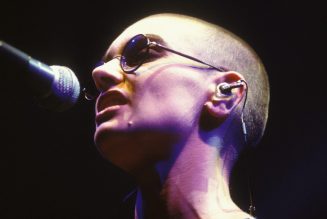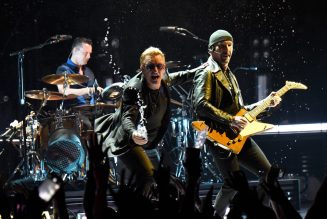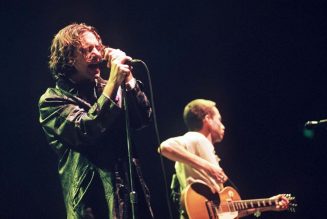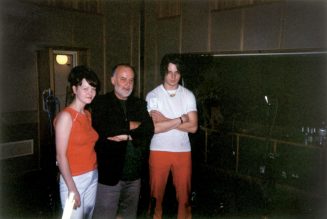Joan Jett’s been up all night.
This is the first thing she tells me when I finally speak with her, a moment I’ve been waiting for as long as I can remember. We all have our reasons for doing what we do, most of mine revolve around Joan Jett.
If Venus came into this world on a delicate, frothy clamshell, Joan Jett rode in on the back of a bound, gagged and fully leashed Poseidon, all five-foot-five of her riding a roaring tidal wave with the ease of an escalator, while flashing a hypnotic sly side grin that says: Just shut up and swim.
Joan Jett is everything.
If you’re a Gen X-er like me, you likely became obsessed shortly after the release of her January 1982 hit single — actually a cover of a 1975 Arrows song — “I Love Rock ‘n’ Roll”, from the album of the same name. Yes, there were women who rocked hard before her, notably trailblazer Suzi Quatro, who Joan consistently notes as her inspiration. But “I Love Rock ‘n’ Roll”, both the single and the album had the benefit of launching mere months after almighty MTV, showcasing Joan — like so many artists — in a way we’d never seen before. Even if we didn’t know what a bad reputation was yet, we were already chanting the lyrics from her previous album, Bad Reputation. MTV showed us a Joan we definitely wanted to meet: leather-clad and studded, screeching and loud, raw and unapologetically talented, her undeniably gorgeous face looking straight into the camera. Wherever she tells us to go, we’ll follow her there.
What, then, has kept Joan Jett up all night? Floods of images come to mind: late nights on the ‘70s LA club scene, touring since her teen years — I mean her 2020 tour was supposed to be with Mötley Crüe, Def Leppard and Poison, and surely those guys don’t go to sleep early, either.
So, why, Joan were you up all night?
“Because I have serial killers for animals,” she says.
Oh?
“I have cats that are really enjoying catching the birds right now,” she has two cats, Felicia and Cleopatra. “So occasionally, I wake up to dead birds, which in the middle of the night I did, because I heard them running around and I found a little decapitated bird…not until after I stepped on it by accident and it felt like pretzels crunching and I’m like, ‘Oh, my God…what did you guys do?’ When I turned on the light, it was a little beheaded finch. It’s horrible.”
She continues, scolding one of them: “You’re not hungry. You didn’t eat the bird. You fucking played with it and tortured it and it died.” She then turns her attention back to me: “I just thought that was a weird way to wake up and I thought I’d share it with you.”
This could not be more utterly perfect.
We chat about our pets, animal rights being a long-time cause of Joan’s, who’s been a vegetarian for decades.
“People are so arrogant, if you haven’t figured that out by now,” she says. “Human beings, just by their nature, are very arrogant. That’s why they have to talk about animals not being smart, so they don’t feel bad when they have to eat them.
“I was a meat-eater for many years, from being a kid up until about– I’m trying to guess, the mid-’80s. My best friend and songwriting partner, producer, manager, Kenny Laguna, he’s been a vegan since he was 11. He never preached about it, he never really busted my balls about it or anything. It’s just something that naturally happened and then I’m wondering, ‘Wait a minute, why am I eating animals if I love animals and I wouldn’t eat my dog, or I wouldn’t eat my cats?’ It made me start thinking and then I read a book about it at the same time called, Diet for a New America, that was written by a guy named John Robbins. He was a part of the Baskin-Robbins-era thing. I don’t think his gripe was animal treatment, it was more about farm-to-table and what happens to everything in the process of going from the farm to the table. That’s where I discovered belatedly, what animals go through and I just couldn’t deal with it.
“I see people and say to them why won’t you just — Meat is meat. Why don’t you just start throwing human beings up there? It’s, ‘The lamb tastes good because it’s a baby. The veal tastes good because it’s a baby.’ Why don’t you get an actual baby? We roast up that baby and that dead baby leg is good? If you talk like that people would freak out. QAnon would say, ‘See? They do eat babies!’”
Only someone who truly loves humanity could expect more of them. And if nothing else, Joan loves and believes in humanity in all forms.
Born in Pennsylvania and raised in Maryland, Joan’s been in New York since 1979.
“Before that, I lived in California, that’s when my band The Runaways were formed,” she says of her all-girl rock group formed in 1975 and managed by notorious record producer Kim Fowley. “My family moved to California in about ’73, I think moved to California for eight years or something, then moved back. Then decided with Kenny that we’d come back to the East coast because just as a plan for a working band, it was a better place to be.”
The ’70s, though, was truly a prime time to be an aspirational music-loving LA teen. The Sunset Strip alone had the infamous Continental Hyatt House (aka “The Riot House”), a center for celebs and rock giants like The Who and Led Zeppelin, and all the sex-drugs-and-rock-n-roll debauchery that went with them. So many of the 70s biggest rock bands got their start at the smaller clubs. DJ Rodney Bingenheimer’s English Disco brought new acts like David Bowie, T. Rex and Blondie to a ready public. Of Bingenheimer’s club, Los Angeles Times reporter Richard Cromelin said in a 1973 article: “Once inside, everybody’s a star.” Before she was officially Joan Jett, she was Joan Marie Larkin, and she was there, too.
She admits there will never be another time like those rocking L.A. ’70s.
“When I was a kid, it was either sit home with my mom and my brother and sister and watch some game on TV, or going out to a club. I’m lucky that my mother didn’t get to ask me about going.”
Joan’s mother bought her an electric guitar and amp for Christmas when Joan was thirteen from Sears. At her first guitar lesson, her teacher told her that girls didn’t play rock ‘n roll. “When I lived in Maryland, I used to read all the rock magazines. There was a magazine at the time called Circus. It was a monthly, like Creem magazine, once a month, and everybody waited to get it because that’s where you got your news. You had to wait a month for that stuff. Which, people forget what anticipation is like, they don’t know what it’s like to anticipate something, to not be able to get it when you want it, and not be instantly gratified.”
Yes. Oh, hell yes.
“There’s something special about that,” she says. “Not being able to get it when you want it makes you want it more. It’s just a more rounded experience, I think. I speak from having experienced both. I can still picture waiting for hours in line when there was a record store called Tower Records in West Hollywood, when the David Bowie album, Diamond Dogs came out. They had a full mural painting that went the whole length of the store, on the outside windows, so the fans could see it. I remember being lined up, looking at that, you just don’t have things like that [anymore].”
“This is actually the first summer I’ve had off since before I started touring. I’d say, since late ’75. The Runaways were formed and we were on the road to, pretty much our whole existence, in most part we toured every year. When The Runaways broke up, I met Kenny in 1979. The Runaways broke up New Year’s Eve, that ’78 into ’79. Then I met Kenny earlier in that year, March or so, and we met to write songs. He was going to produce the songs we wrote. Also, we wanted to form a band and get out there. I knew it couldn’t be girls because they’d immediately compare it to The Runaways and I just couldn’t deal with that. So, we decided to make it all guys. We advertised in LA Weekly, ‘Joan Jett looking for three good men.’ We formed a band, and pretty soon after that, we moved to New York. Just took everybody. We all went to New York. All transplanted.”
The guys in Joan’s band would eventually be known as The Blackhearts.
New York gave Joan and Kenny so many more touchstones to promote her solo record, and that’s what they set out to do. But their attempts to get her a record contract seemed impossible: twenty-three record labels garnered twenty-three rejection letters.
The one word universal in every language—“no”—did not apply in Joan’s world. “No”, when it came from music execs, only inspired Joan to keep going. If you think this kind of resistance is no longer an issue, consider yourself lucky. And thank women like Joan Jett who meticulously carved and kicked the way for today’s women who want to step to the fore. Imagine creating something entirely new, a road in a dark forest with only the sound of breathing dragons.
If no one label would sign them, they’d have to print and sell records themselves, even if they had to do it out of the back of Kenny’s Cadillac—which is exactly what they did. That was the beginning of Blackheart Records.
In her own words: “Tell me I can’t do something and you’ll make sure I’m gonna be doing it.”
In late 1975 when Joan and drummer Sandy West with frontwoman Cherie Currie, guitarist Lita Ford and bassist Jackie Fox formed The Runaways, this was only 2 years after women were granted the right to serve on a jury, and 2 years after Roe v Wade legalized first-trimester abortion. 1975 was only one year after women could get their own credit card, and 3 years before the Pregnancy Discrimination Act determined that women couldn’t get fired from their jobs for being pregnant.
Just for performing on stage Joan had her head cracked open, a fractured rib. “I didn’t know how to make sense out of a world that would give girls shit for playing guitars,” she said in her 2018 documentary Bad Reputation.
Joan founded The Runaways nearly half a century ago. Since then she’s lent her famous voice to causes that support all living things, including LGBTQ rights. Joan’s never sat back and hoped for equality. She’s taken the lead and shown others how it’s done.
All musicians have the option to just shut up and sing, and some are content doing just that. Even though it’s impossible to deny that Joan’s the hardest working woman in rock and roll, she stresses that it’s not all about her. “I’m not the doer,” she says. “I’m an instrument.”
“It’s hard to sit around claiming credit for things. That’s not why I did this. I do it just because I can. It’s right for women to be able to play music and being told you can’t play rock ‘n roll because you’re a woman…I know what that’s about. That’s not saying you can’t master the instrument. You’re saying women can’t express sexual feelings, emotions, thoughts, because rock ‘n roll by its nature is sexual. So, if a woman or girl, teenager, is going to be singing rock ‘n roll, they are damn well going to be singing about sex, because it’s one and the same. People were very uncomfortable with teenage girls singing rock and roll, but I don’t think they were quite aware of why.
“It’s very complicated, but you can’t let– if you believe, no matter what it is. It doesn’t have to be rock ‘n roll, you can apply this to any part of your life. Any kind of work you wanted to do. Just because women may have not done it before, that doesn’t mean they can’t do it now. There’s a million things. I know we have issues with trying to get enough women involved in STEM programs so they’re able to learn science, math, coding, and all that stuff as well as boys. When they’re given access to it, they’re just as good, if not better. Sometimes that’s the problem. You don’t want to be with these girls, and they’re going to beat us all.
“When women finally get to hold the money and decide where the money goes, that will be when the real change happens. Until women are named CFOs and things like that in big fortune 500 companies, that’s when things will change. When they’re directing the dollars.
“We are getting closer. Once in a while, you get a two-steps-forward-one-step-back. But once in a while, you get the other way.”
To date, only six female or all-female recording artists have been inducted into the Rock and Roll Hall of Fame. In 2015, Joan became one of them. “That was pretty special,” she says. “Just seeing the people in the audience…. As I walked out there, and they announced me and I walked out, the first people I saw in the audience was Paul McCartney and Ringo Starr, and they stood up and started a five-minute standing ovation. I was just overcome at that point. I started crying. It made me think back to my bedroom in the early ’70s, with Paul McCartney’s, I believe it’s his first solo album that had “Maybe I’m Amazed” on it. I remember sitting in my room with that album and then flashing to him, leading a standing ovation, and it’s just cyclical, it’s so crazy. You realize that a lot of these universal principles may be true. It’s got nothing to do with me. It’s just the way the universe works. I really believe that. I’m lucky enough to be one of the instruments.”
Her impact as a feminist icon is immeasurable, but not something she cognitively considers.
“The only idea I have of it is my personal interactions with women, young women, girls, little girls, women of all ages. From the tiniest two-year-old woman to a 98-year-old woman. All of them have said things that make me want to cry and make me know that I’m doing the right thing. They feel inspired from it. I just know that it makes a difference in their life, whether it makes them go after their goals in life, that’s great, but if it just makes them feel good for a day, that’s great too. You just want to inspire women to do what’s good for them but, hopefully, in a positive way.”
In case you’re wondering what the true heart of a hero looks like, this is it, kids. It’s not glitz and glam, it’s in the fighting, the bloodshed and coming out the other end a real person brave enough to stare the ugly stuff square in the eye, but still be a deep-to-the-core empathic human.
“I don’t want to be a Marvel comic at all. I don’t want to be unrelatable,” she says. “I’m Joan right now. I’m Joan Jett all the time, but I only look like the Joan Jett people see in pictures with the heavy makeup, that’s my stage Joan Jett. That, I’m sure part of it is armor and protection, especially coming out of The Runaways time. I needed it, the protection, the armor. I don’t know, it’s sort of morphed as I get older, but it’s still there. If you saw me now, I’d have no makeup on, my hair wouldn’t be really done or anything because it’s sloppy, and I’d be fine with that.”
She’s working on new music, so stay tuned. “I wouldn’t be surprised if there’d be something in the new year,” she says. In 2020 she covered “Jeepster” on the T-Rex tribute album Angelheaded Hipster: The Songs of Marc Bolan & T. Rex, appearing along with Kesha, Nick Cave and Lucinda Williams on the record, to name a few.
Her 2020 tour was postponed due to COVID. “It’s very hard. It’s like you call into question everything you are. Because that’s what I’ve been my whole life is a musician in a rock ‘n roll band. I haven’t really given myself time or space to do other things or pursue other things. Not that I want to, really, but now you’re forced to just stop.
“I don’t know what the right word is yet, but we have no right to complain. We’ve got a good life, people look up to you, and you’re famous and everyone always perceives people are richer than they are. If you’re a rock band, any kind of success, you’re a billionaire. They obviously don’t know how things work. It’s not ’19-whenever. I don’t know when this ever worked, really. Everyone is grieving the loss of their art, however they look at it, the loss of their friends, their bandmates their crew, the thing they’ve built together, which, to me, is ongoing and long.
“We’re going to work to just be rehearsing most of the winter and just keep our jobs happening, maybe write some new stuff. Just seeing each other will make us happy, happier, being together, playing music, even if it’s just rehearsing.
“I think they tried to push that stadium tour back to ‘21. Theoretically, that would be starting in June.”
“I don’t think anybody knows anything,” I say, about the pandemic.
“You don’t hear this aspect talked about, actually,” she continues. “I notice I haven’t seen specifically the music industry being discussed. They discuss everything else. They’ve discussed television and movies. They’ve talked about Broadway coming back, but I’m not seeing anybody talk at all about live music.”
She refers to the death of the smaller music venues as “a killer”. “I mean, that’s the incubator right there,” she says. “Without incubators, you can’t have any kind of life, really. A lot of small bands build an audience. You need small clubs.” Like everyone, she hopes they can reopen when it’s safe to do so. “Maybe when it’s time, the right thing will happen somehow and people will help them get their clubs back up and running. Anything from the GoFundMe things, pages. Help clubs reopen. I’m sure they will get a lot of support that way. If music comes back, they can’t not address that. Because music can’t exist without small clubs”
She still loves being in front of a live audience. Streaming simply doesn’t compare. “There’s nothing like it. You can’t compare it. If you’ve been to see a band live and then you watch them streaming, if you’re a fan, it’s great to see the band you like in any way, but there’s no comparison to a live experience. You got to understand too, we grew up with loud music. If you didn’t grow up with loud music, you’d be somebody that walks in and goes, ‘Oh, it’s too loud. It’s too many people.’
“If we got to wear masks, fine. I’m fine with it. I can sing with a mask. I’ve done it. I don’t give a shit. I just want to do what’s good for everybody. We’ll see. I think maybe when this comes back, people will hopefully want to get out, want to experience life. Maybe that would be a new way for people that didn’t experience concerts live to start living a little bit more, not just let everything be a one-note stream.”
Tough to imagine a world without Joan Jett in it, but what would Joan Marie Larkin have done if she didn’t pick up music?
“Really, I wanted to be an astronaut,” she says. “I wanted to be an archeologist, which makes me realize I want to know where we came from and where we’re going. As a really little kid, you don’t really think about it yet. That’s what your higher self is telling you. Now, I don’t know. I’d love to be a tree doctor. I love trees. I’d love to be an arborist, a tree doctor, and figure out what’s going on with all of our trees. Yes, they take care of each other, too. If there’s a tree that’s sick, the roots underneath are all connected. They create an underground town of roots. If a tree is sick, they send healing energy or whatever it is how they take care of themselves. They send it to each other.”
Whether she knows it or not, this is Joan’s mantra for how she lives her life. Fully aware that she’s a part of something much bigger than herself, and a living thing amongst all living things, trying to create a world of tolerance and appreciation. And kick-ass music.
So, after all is said and done, does she still love rock and roll?
“I do. I do,” she says. “I love what I do. I love hard rock and roll.”





